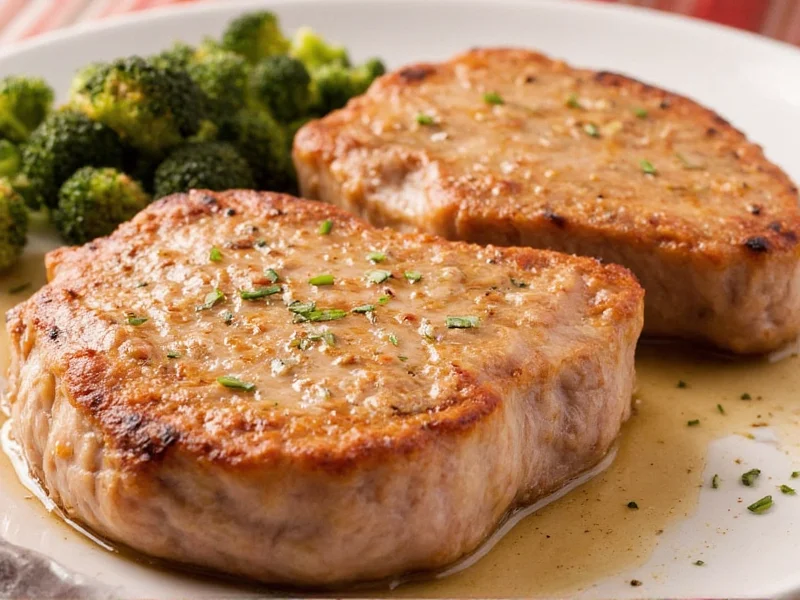Seasoning pork chops properly transforms this versatile cut from bland to extraordinary. While pork has a naturally mild flavor that pairs well with many ingredients, the right seasoning combination can elevate your cooking from ordinary to restaurant-quality. Understanding which spices complement pork's characteristics ensures consistently delicious results whether you're grilling, pan-searing, or baking.
Why Proper Seasoning Matters for Pork Chops
Pork chops benefit significantly from thoughtful seasoning due to their relatively lean composition compared to other cuts. Unlike fattier cuts that baste themselves during cooking, pork chops rely on external flavor enhancement. The right seasoning not only adds taste but also helps form a flavorful crust through the Maillard reaction when seared at high temperatures. This chemical process creates complex flavors and appealing browned surfaces that make pork chops visually and gastronomically satisfying.
Top 5 Seasoning Combinations for Pork Chops
Certain spice combinations have proven particularly effective with pork chops through culinary tradition and scientific understanding of flavor pairing. Here are the most reliable options:
- Classic Savory Blend: Salt, black pepper, garlic powder, and smoked paprika (the gold standard for everyday cooking)
- Herb-Forward Mix: Rosemary, thyme, sage, and garlic (ideal for oven-baked chops)
- Southwest Kick: Chili powder, cumin, garlic, and a touch of cayenne (perfect for grilling)
- Sweet-Savory Balance: Brown sugar, mustard powder, garlic, and black pepper (excellent for caramelization)
- Simple Salt Enhancement: High-quality sea salt or kosher salt alone (showcases premium pork)
Individual Spices and Their Impact on Pork Flavor
Understanding how specific spices interact with pork helps you create custom blends tailored to your preferences. Pork's mild flavor serves as a perfect canvas for various seasonings:
- Salt: The most crucial component that enhances natural flavors and helps retain moisture. Use kosher salt for better control.
- Black Pepper: Adds subtle heat and complexity without overwhelming pork's delicate taste.
- Garlic Powder: Provides consistent garlic flavor throughout (fresh garlic can burn during searing).
- Smoked Paprika: Contributes depth and a hint of smokiness that complements pork's natural sweetness.
- Onion Powder: Adds savory-sweet notes that pair exceptionally well with pork.
- Mustard Powder: Activates enzymes that tenderize meat while adding tangy complexity.
| Seasoning Profile | Best For | When to Apply | Special Tips |
|---|---|---|---|
| Classic Savory | Everyday cooking, pan-searing | 45-60 minutes before cooking | Add fresh rosemary sprigs while cooking for extra aroma |
| Herb-Forward | Oven-baked chops, thicker cuts | 30 minutes before cooking | Press herbs gently into meat surface |
| Southwest Kick | Grilling, outdoor cooking | 20 minutes before cooking | Avoid excessive sugar to prevent burning |
| Sweet-Savory | Cast iron searing, caramelization | Right before cooking | Monitor closely to prevent sugar burning |
| Simple Salt | Premium quality pork, sous vide | 2+ hours before cooking or after | Use flaky sea salt for finishing |
Timing Your Seasoning Application
The timing of seasoning application significantly affects the final result. For the best seasoning for pork chops before grilling or pan-searing, apply salt-based rubs at least 45 minutes before cooking. This allows salt to penetrate the meat and begin the process of protein breakdown, which improves both flavor and texture. The salt draws out moisture initially, then gets reabsorbed along with the meat's natural juices, creating a more flavorful interior.
For seasoning pork chops with sugar-containing blends, apply immediately before cooking to prevent the sugar from drawing out too much moisture or beginning to caramelize prematurely. Sugar burns at lower temperatures than meat sears, so timing is crucial for the perfect crust without bitterness.
Adjusting for Cooking Methods
The best dry rub for pork chops varies depending on your cooking technique:
- Grilling: Opt for robust flavors like smoked paprika, cumin, and chili powder that can withstand high heat and complement smoky notes. Avoid excessive sugar which can burn on open flames.
- Pan-Searing: Use the classic savory blend with salt, pepper, garlic, and paprika. The controlled heat allows for perfect crust development without burning delicate spices.
- Oven-Baking: Herb-forward mixes work exceptionally well as the longer cooking time allows subtle herb flavors to penetrate the meat.
- Air Frying: Use lighter seasoning applications as the intense, circulating heat can concentrate flavors more than other methods.
Common Seasoning Mistakes to Avoid
Even with the best intentions, certain seasoning errors can undermine your pork chop preparation:
- Underseasoning: Pork chops need more salt than you might expect. A common guideline is 3/4 to 1 teaspoon of kosher salt per pound of meat.
- Applying wet rubs too early: Moisture-based marinades can create steaming rather than searing if applied too close to cooking time.
- Overcomplicating blends: More than 5-6 spices often creates flavor confusion rather than harmony.
- Seasoning only one side: Always season both sides of pork chops for balanced flavor.
- Using old spices: Ground spices lose potency after 6-12 months. Freshness dramatically impacts the final result.
Creating Your Perfect Pork Chop Seasoning
The ideal seasoning for pork chops ultimately depends on your personal taste preferences and the specific cut you're preparing. Thicker chops can handle more robust seasoning profiles, while thinner cuts benefit from simpler blends. When developing your own mix, start with the classic foundation of salt, pepper, garlic, and paprika, then adjust one element at a time to discover your preferred balance.
Remember that the best simple pork chop seasoning recipe often outperforms overly complicated blends. Quality ingredients, proper seasoning timing, and understanding how spices interact with pork's natural characteristics matter more than the number of ingredients in your rub.











 浙公网安备
33010002000092号
浙公网安备
33010002000092号 浙B2-20120091-4
浙B2-20120091-4